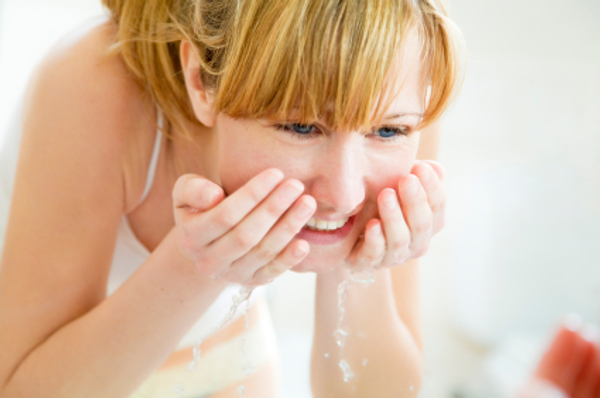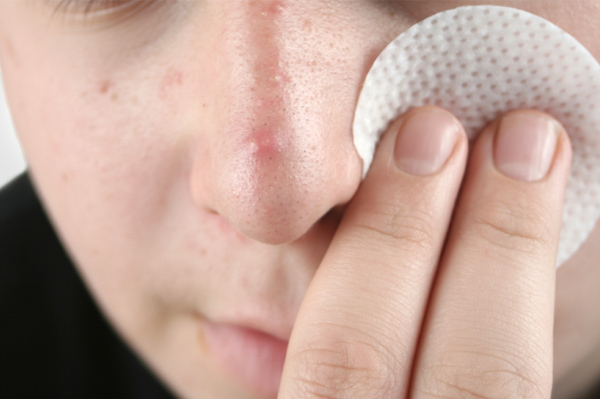
Most of us are hit with zits at some time in our lives. Blemishes and acne can pop up on our face, neck, back, chest and shoulders. It isn’t a serious health risk, but severe cases can cause permanent scarring on the outside — and inside.
Battling acne
Battling chronic acne can lead to emotional stress, particularly in adolescents who already face the turmoil of physical and psychological changes. The stress of acne can lead to poor self-image, social inhibition and anxiety.
Types of acne
Acne can occur in the following forms:
Comedones: Non-inflammatory papules that can be open or closed .
Whiteheads: White dots that are pores impacted with oil and covered by skin layers.
Blackheads: Black bumps that are impacted pores in which material pushes out through the follicles. The black color is not from dirt. It may be from bacteria and matter that reacts with oxygen.
Papules: Lesions that are inflamed and can be tender to the touch. These usually appear as small, pink bumps on the skin.
Pustules: Lesions that are inflamed and filled with pus. They may be red at the base.
Nodules: Solid lesions that are large, painful and lodged deep within the skin. Papules, pustules or nodules are more serious lesions appearing red and swollen due to inflammation or infection of the tissue around the clogged follicles.
Cysts: Pus-filled lesions deep under the skin. These may cause scarring and pain.
What causes acne?
Several key factors contribute to acne development.
Hormones: Androgens elevate during puberty causing sebaceous glands to get larger and produce more sebum. Hormonal changes also occur during pregnancy or after starting or stopping birth control pills. Hormones affect the skin's oil glands which create sebum, an oily substance that spills onto the skin through hair follicle openings . The blend of oil and cells allows bacteria that normally live on the skin to grow in the follicle openings. As a result, the pores become clogged and pimples develop.
Genetics: Researchers believe that there may be a genetic predisposition to developing acne, inherited from parents. This doesn't mean a teenager is destined to repeat their parents' acne misery, but they may be more likely to have issues with problem skin.
Medications: Some drugs — anti-epilepsy medication, prednisone, androgens and lithium, for example — can cause acne, even in adults.
Cosmetics: Anything with a greasy consistency can change the cells of the follicles, causing them to stick together which results in a plugged pore. Water-based products are less likely to cause acne.
Stress: High levels of stress can be rough on your skin. CRH is released into the blood from the brain during times of stress and creates cortisol that causes oil glands to produce more oil — which leads to pores getting blocked. Deep breathing, exercise, joining a teen support group or talking to parents, clergy or a trusted counselor can all help teens deal with stress.
Friction: Irritation of your skin caused by leaning on or rubbing the skin, or even harsh scrubbing, may cause acne. Bike helmets, backpacks or tight collars can also irritate the skin and lead to a breakout.
Next up: Acne treatments and prevention
{pageBreak}

Conventional treatments
Dermatologists are doctors who specialize in skin problems and often treat acne patients, particularly in severe cases. Family or general practitioners, pediatricians or internists may treat milder forms.
OTC topical drug treatments: Over-the-counter medications include salicylic acid, benzoyl peroxide, alpha-hydroxy acid and tea tree oil and are available in many forms including gel, lotion, cream, soap or pads. Used regularly, they can be moderately effective. They may take four to eight weeks to have a positive effect.
Prescription topical drug treatments: The prescription topical drug treatments that are used to treat acne include stronger doses of benzoyl peroxide, clindamycin, erythromycin, antibiotics, tretinoin, tazarotene, adapalene and azelaic acid.
Prescription oral drug treatments: For patients with moderate to severe acne, doctors often prescribe oral antibiotics in addition to topical medication. Oral antibiotics are thought to help control acne by curbing the growth of bacteria, thereby decreasing inflammation. These medications are usually taken daily for a period of four to six months, then tapered off and discontinued as the acne improves. The most potent oral drug — isotretinoin — is usually taken once or twice a day for 16 to 20 weeks. It is believed to markedly reduce the size of the oil glands so that less oil is produced and to help prevent clogged pores. Isotretinoin can cause birth defects in the developing fetuses of women who are pregnant while taking the drug. Women of childbearing age must not be pregnant and must not become pregnant while taking isotretinoin.
Acne prevention
More effective than constantly attacking the symptoms of acne is to address the underlying causes that you can control.
Cut caffeine. At least cut back on those sodas and coffees. Caffeine stimulates the glands to produce sebum that clogs pores and hair follicles.
Get moving. Exercise is one of the best cures for acne. While it does stimulate sweat glands, it keeps them working to remain unclogged which prevents flare-ups. It's important to rinse your face after heavy exercise.
Eliminate or reduce highly processed foods, sugars and grains. Refined carbohydrates and sugar cause a surge of insulin and an insulin-like growth factor called IGF-1 in the body. This can lead to an overproduction of male hormones, which cause pores in the skin to secrete sebum. In addition, IGF-1 causes skin cells known as keratinocytes to multiply, a process that is associated with acne.
Avoid or minimize hot water and chlorine. Avoid chlorine and too much exposure to hot water which can cause oxidative damage. Limit showers to one per day, use a lower water temperature and decrease soak time in the bath.
Add more water. Drink lots of water. Water hydrates the skin and prevents inflammation to keep it healthy and smooth.
Don't be picky. Picking or squeezing blemishes can make acne worse.
Don't overwash. Don't wash your face too often. Once in the morning and once before bed is enough. Too many soaps and chemicals can trigger acne flare-ups. Pat your face dry after cleansing instead of harsh rubbing which can irritate the skin and inflame acne.
Avoid using a lot of different products or harsh chemicals. Too many moisturizers and lotions can clog pores and trigger flare-ups. Avoid all harsh chemicals whenever possible, and consider using only organic skin care products, preferably ones that use nourishing botanicals.
Most teenagers battle a blemish here and there, but for those who have chronic acne, just looking in the mirror can become an emotional struggle. By partnering with parents, teens can tackle the underlying causes of acne and face the world with more confidence and a healthy glow.
More on teen skin care
Skin care and your teen
Helping teens tackle common skin care problems
Acne and teen self-esteem